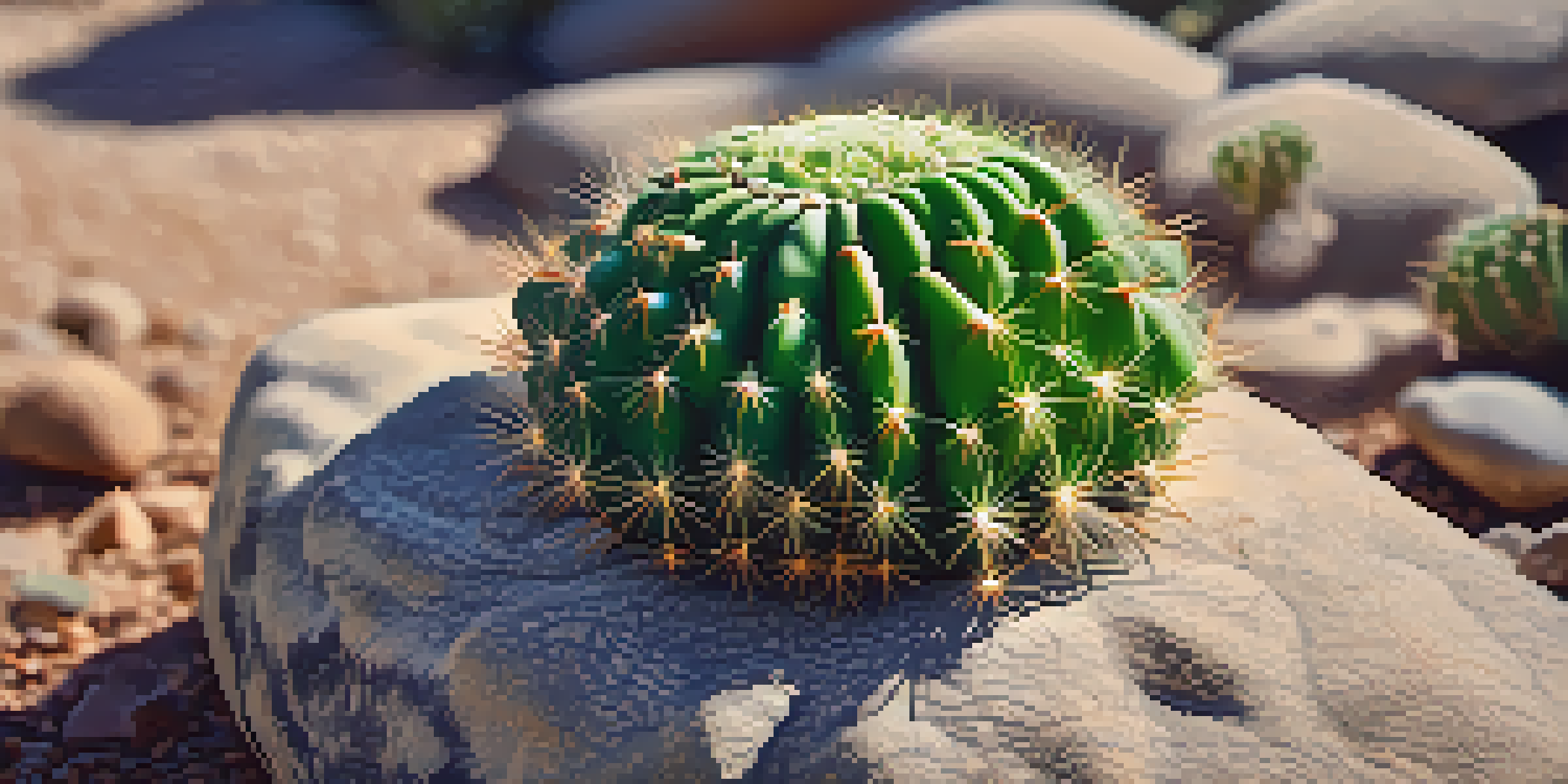Peyote and Mental Health: Impacts on Addiction Recovery

Understanding Peyote: A Brief Overview
Peyote is a small cactus known for its psychoactive properties, primarily due to the compound mescaline. Traditionally used in Native American rituals, it offers profound spiritual experiences. Understanding peyote involves recognizing its cultural significance and its effects on the mind and body.
The use of psychedelics is not just about altering consciousness; it's about understanding the mind and enhancing the capacity for healing.
The use of peyote dates back thousands of years, where it played a crucial role in various healing practices. This historical context highlights its importance beyond mere recreational use. As we explore its modern applications, it’s essential to acknowledge both its cultural roots and its potential therapeutic benefits.
In recent years, there has been a resurgence of interest in psychedelics, including peyote, for mental health treatment. Research is beginning to uncover how substances like mescaline can influence mental states, particularly in the context of addiction recovery. This sets the stage for a deeper understanding of its potential role in healing.
The Connection Between Mental Health and Addiction
Mental health and addiction are deeply intertwined, often creating a cycle that can be hard to break. Individuals struggling with mental disorders may turn to substances as a form of self-medication, which can lead to dependency. Understanding this connection is vital for developing effective treatment strategies.

Many people facing addiction issues also deal with underlying mental health conditions such as anxiety, depression, or PTSD. These conditions can exacerbate the challenges of recovery, making it crucial to address both simultaneously. By recognizing the dual diagnosis, treatment can be tailored to meet the individual's needs.
Peyote's Cultural Significance
Peyote has a rich history in Native American rituals, highlighting its importance beyond recreational use.
This cyclical relationship highlights the necessity for holistic approaches in addiction recovery. Effective treatment often requires integrating mental health care with addiction services. This is where innovative solutions, like the potential use of peyote, come into play, offering new avenues for healing.
How Peyote Affects the Brain and Behavior
Peyote's active compound, mescaline, interacts with serotonin receptors in the brain, influencing mood and perception. This interaction can lead to altered states of consciousness, allowing users to explore their thoughts and feelings in a new light. Such experiences may catalyze significant personal insights, which can be particularly beneficial in recovery.
Addiction is a complex condition, a brain disorder that is manifested by compulsive substance use despite harmful consequences.
Research suggests that psychedelics like mescaline may promote neuroplasticity, the brain's ability to adapt and change. This could facilitate new patterns of thinking and behavior, helping individuals break free from addiction cycles. By fostering a sense of connection and introspection, peyote may support mental health recovery.
However, it’s essential to approach peyote use with caution and respect. While some report positive experiences, others may have challenging encounters. Understanding the wide range of effects is crucial for anyone considering its use in a recovery context.
Peyote in Addiction Treatment Programs
Integrating peyote into addiction treatment programs is a topic of growing interest among clinicians and researchers. Some programs advocate for its use in controlled settings, where guidance and support are provided. This structured approach can help harness its therapeutic potential while minimizing risks.
Treatment programs that incorporate peyote often emphasize the importance of a supportive environment. By combining therapy with peyote experiences, individuals may gain insights that lead to transformative healing. The goal is to create a safe space for exploration, reflection, and growth.
Holistic Addiction Treatment
Integrating peyote into addiction recovery emphasizes the need to address both mental health and substance use simultaneously.
While the potential benefits are promising, more research is needed to establish best practices. Understanding how to effectively integrate peyote into existing frameworks can help maximize its positive impact on recovery journeys. This ongoing exploration is vital as we seek to innovate in addiction treatment.
Personal Experiences: Healing Stories with Peyote
Many individuals have shared transformative experiences with peyote, often describing profound personal revelations. These stories highlight how peyote can help individuals confront their past traumas and emotions, paving the way for healing. Personal narratives serve as powerful testaments to its potential in addiction recovery.
One common theme in these stories is the sense of connection, both to oneself and to others. Many users report feeling a heightened sense of empathy and understanding during their peyote journeys. This connection can be a vital component of recovery, fostering relationships and support systems.
However, it's important to note that experiences vary widely among individuals. While some find great benefit, others may not have the same outcomes. Listening to these diverse narratives can provide valuable insights into the complexities of using peyote in mental health contexts.
Challenges and Considerations in Using Peyote
Despite its potential benefits, using peyote comes with challenges and considerations. The legality of peyote varies widely, which can impact access for those seeking treatment. Understanding local laws and regulations is crucial for anyone considering its use in a therapeutic context.
Additionally, not everyone is suited for peyote use, especially those with specific mental health conditions or a history of adverse reactions to psychedelics. It’s essential to approach this option with caution and seek professional guidance. Screening and assessments can help determine if peyote is a suitable choice.
Research on Peyote's Effects
Ongoing studies aim to uncover peyote's therapeutic potential, particularly its role in promoting healing and recovery.
Furthermore, the setting in which peyote is consumed plays a significant role in the overall experience. A supportive, controlled environment can enhance the positive effects, while an unsupervised setting may lead to challenging experiences. Careful consideration of these factors is essential for maximizing safety and effectiveness.
The Future of Peyote Research in Mental Health
As interest in psychedelics for mental health treatment grows, so does the need for rigorous research. Studies focusing on peyote and its effects on addiction recovery are still in the early stages, but the preliminary findings are promising. Continued research could unlock new pathways for healing and recovery.
Future studies aim to explore optimal dosages, settings, and therapeutic frameworks for peyote use. By gathering data and understanding its impacts, researchers can provide valuable insights into its role in addiction recovery. This knowledge can help shape treatment approaches and inform best practices.

The future of peyote research is not just about the substance itself, but also about understanding the broader implications for mental health care. As we learn more, we can work towards integrating peyote responsibly into treatment paradigms, maximizing its potential benefits for those seeking recovery.